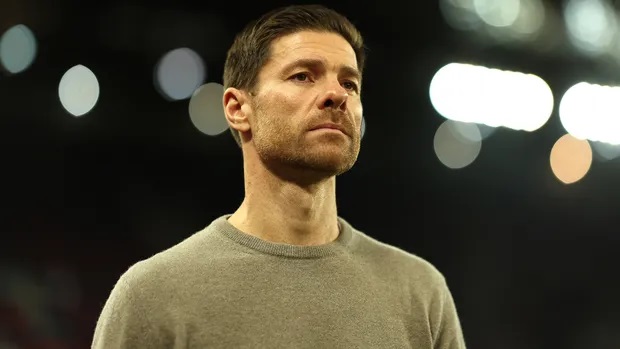Jude Bellingham isn’t the only Bundesliga storyline Liverpool fans should be monitoring in the coming weeks and months.
Because while the Borussia Dortmund star remains very much the Reds’ No.1 summer transfer target, an hour or so south another stylish, classy midfielder is staking his own claim for a future role with the Reds.
It’s fair to say that Xabi Alonso has made quite the impression since taking over as manager of Bayer Leverkusen in October. Having inherited a team 17th in the table, and seemingly mired in a relegation battle, the former Spain international suddenly has Die Schwarzroten playing and their fans looking upwards again.
They’re the Bundesliga’s form side, with five straight wins either side of the World Cup, and another against Bellingham’s Dortmund at the BayArena on Sunday would move them to within touching distance of the European qualification places. They already have a Europa League tie against Monaco to look forward to next month, having beaten Atletico Madrid to third place in their Champions League group.
So far, so good, as far as Alonso is concerned. There were eyebrows raised when the 41-year-old answered Leverkusen’s SOS call, but the early signs are that this is a man who is cut out for top-level management, and that he has the skills, knowledge and temperament to succeed.
Patience has certainly been a virtue, in that regard. Alonso retired from playing in 2017, but has chosen his jobs carefully since, working first with Real Madrid’s U-13 side and then with Real Sociedad’s B team before taking the plunge with Leverkusen last autumn.
Typical Alonso, you could say. An intelligent, thoughtful footballer, who won just about every honour there was to win, the Basque native seems to have carried that cerebral approach into his post-playing career.
“To understand the development of Xabi as a coach, you need to start by understanding his background,” Roberto Olabe, Real Sociedad’s sporting director, tells GOAL.
“I was his coach in 2002 at Real Sociedad, when he was really young, and even at this moment, he already had proper leadership skills. I remember we were in a bad situation, close to relegation to the Segunda Division, and he really showed his strong personality. Even as a young player, he would speak with important players like Darko Kovacevic, Nihat Kahveci, Mikel Aranburu. He would tell them what to do.
“Xabi played football very well, but he was never a fast player. So he had to develop his way, and his way was all about knowing the game, understanding his strengths and weaknesses, knowing how to compensate for his lack of pace. His game was based on intelligence, and that can only help him as a manager.”
Success, of course, followed Alonso wherever he went as a player. He won the Champions League with Liverpool in his first season, then later won it again with Real Madrid before moving to Bayern Munich in the twilight of his career and winning three Bundesliga titles.
With Spain he became a two-time European champion and a World Cup winner, a key part of probably the greatest international team ever assembled. To win 114 caps, in an era of Xavi, Andres Iniesta, Sergio Busquets, Cesc Fabregas and the rest, tells you plenty.
He also, and Olabe believes this will be key to his managerial career, worked under some of the best and most high-profile coaches in the game along the way.
“I think he’s been very lucky in his career, because players don’t get to choose their coach – most of the time, anyway!” Olabe says.
“But you look at the coaches Xabi has worked under. John Toshack, a strong coach. Then Raynald Denoueix, who was all about possession and understanding the role. Later, Rafa Benitez, one of the best tactical coaches. Then he works with [Jose] Mourinho, Vincente del Bosque, Pep Guardiola, Carlo Ancelotti. He didn’t choose those, but how lucky was he to have different profiles of coaches, huge coaches, to learn from?
“And listen, this guy is very smart, so I am sure that he can take some things from each of them.”
Alonso himself has referred to picking up “a lot of knowledge” from his playing career, referring, for example, to Guardiola’s “relentless enthusiasm”, to Toshack’s “decisiveness” and to the analytical approach of Benitez as key influences.
Olabe saw first-hand his work at Real Sociedad B, where he followed current first-team coach Imanol Alguacil and enjoyed significant success, guiding the team to fifth in the Segunda B Division (Spain’s third tier) in his first season, before winning the competition in his second.
He worked with the likes of current first-teamers Jon Pacheco, Robert Navarro, Urko Gonzalez de Zarate, as well as Martin Zubimendi, currently the subject of serious transfer interest from Arsenal, and Olabe says his influence was clear from day one.
“Can you imagine if Xabi says to a young player ‘are you ready to play in La Liga?’” he smiles. “This guy will be so motivated!
“I remember being struck by how humble he was. He won everything as a player and had so many experiences in different countries and leagues, but he was just like another coach with us. He knew he was inside a process, and he understood that while his voice was important, nobody knows everything.”
Alonso’s preferred style swiftly became obvious, and should come as no surprise to anyone who watched him play.
“He’s a midfielder still!” says Olabe. “And I think midfielders want to have control of the game. If they don’t, they suffer a lot.
“He wants his team to have the ball, to be balanced, to control the space with possession. He wants to build this midfield zone, and he wants that axis player that can help him do that.”
At Leverkusen, that style is still emerging, as he balances the demands of picking up results while nailing down a playing philosophy. “That’s the challenge,” says Olabe. “Here he had autonomy to try things, but now he has that pressure to adapt and win games quickly. It was maybe the first time since he was a teenager that he was with a team that was struggling in the league.”
They’re not struggling at the moment, though, with Alonso finding a way to get a hitherto underachieving squad moving.
It helps, for sure, that he has a clutch of highly-talented younger players, with the likes of Adam Hlozek, Jeremie Frimpong, Moussa Diaby, Callum Hudson-Odoi and Florian Wirtz, the jewel in Leverkusen’s crown, all thriving. Their only league defeats since his arrival have been against Frankfurt and Leipzig, the teams currently occupying second and fourth place in the table.
Liverpool, naturally, will have a close eye on his progress. Jurgen Klopp, of course, is still contracted until 2026, but the struggles of Steven Gerrard at Aston Villa mean his presumed successor is far from obvious. Alonso remains fondly remembered by Reds fans, and has nothing but good memories of his own from his five years on Merseyside.
For now though, he is merely looking to establish himself as yet another Basque coach operating at the highest level.
“So, so many!” smiles Olabe. “Real Sociedad had not only Xabi, but also Mikel Arteta, Julen Lopetegui, Unai Emery, Javi Gracia. Even our coach now, Imanol, came from the same region.
“It is not a coincidence. Gipuzkoa is a region of 700,000 people, and yet all these great coaches came from there. Maybe it’s the culture that we have in Basque country, regarding the work ethic, the mindset. Maybe that helps push us to be leaders.”
He finishes: “With Xabi, one thing to know about him is that he considers every decision he takes very carefully. So if he chooses now to go to Leverkusen, it is because he feels he is ready.
“He has stuck to the plan so far in his coaching career, and now he has taken this big step, and I say good luck to him. I have no doubt he will do well.”
Well enough to end up in the Liverpool hotseat in a few years’ time?
Time will tell… Source: goal.com







